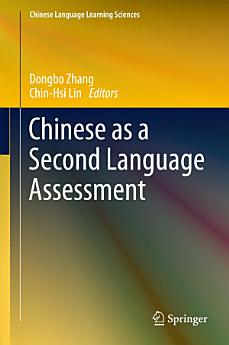Chinese as a Second Language Assessment
Dongbo Zhang · Chin-Hsi Lin
ມ.ສ. 2017 · Springer
ປຶ້ມອີບຸກ
293
ໜ້າ
reportບໍ່ໄດ້ຢັ້ງຢືນການຈັດອັນດັບ ແລະ ຄຳຕິຊົມ ສຶກສາເພີ່ມເຕີມ
ກ່ຽວກັບປຶ້ມ e-book ນີ້
This book brings together 13 original research papers that address emerging issues in the assessment of Chinese as a Second Language (CSL) in five major areas, including standards in CSL assessment; development of CSL tests; assessment of diverse knowledge and skills; computer-supported assessment; and CSL assessment in relation to instruction and teachers’ assessment competence. It goes beyond the psychometric testing of Chinese and provides cutting-edge examinations of the interfaces of assessment with sociology of language, acquisition, pedagogy, and modern technologies, as well as teacher education. Given its unique features and broad range of topics, the book offers an intriguing and valuable resource, not only for scholars and researchers but also teacher educators and assessment practitioners who are directly or indirectly involved in CSL assessment.
ກ່ຽວກັບຜູ້ຂຽນ
Dongbo Zhang and Chin-Hsi Lin both have extensive experience teaching Chinese as a Second Language and studying CSL learning, instruction, and assessment. They have also been actively involved in Chinese teacher preparation and conducted workshops for K-16 Chinese teachers where assessment of Chinese has often been highlighted. As scholars of CSL education, former Chinese teachers and now Chinese teacher educators, they have recognized the fact that CLS assessment remains an under-researched area despite the rapid development of CSL research, which tends to focus largely on issues of Chinese pedagogy and acquisition. The current work is an attempt to remedy this imbalance and advance the field of CSL assessment.
ໃຫ້ຄະແນນ e-book ນີ້
ບອກພວກເຮົາວ່າທ່ານຄິດແນວໃດ.
ອ່ານຂໍ້ມູນຂ່າວສານ
ສະມາດໂຟນ ແລະ ແທັບເລັດ
ຕິດຕັ້ງ ແອັບ Google Play Books ສຳລັບ Android ແລະ iPad/iPhone. ມັນຊິ້ງຂໍ້ມູນໂດຍອັດຕະໂນມັດກັບບັນຊີຂອງທ່ານ ແລະ ອະນຸຍາດໃຫ້ທ່ານອ່ານທາງອອນລາຍ ຫຼື ແບບອອບລາຍໄດ້ ບໍ່ວ່າທ່ານຈະຢູ່ໃສ.
ແລັບທັອບ ແລະ ຄອມພິວເຕີ
ທ່ານສາມາດຟັງປຶ້ມສຽງທີ່ຊື້ໃນ Google Play ໂດຍໃຊ້ໂປຣແກຣມທ່ອງເວັບຂອງຄອມພິວເຕີຂອງທ່ານໄດ້.
eReaders ແລະອຸປະກອນອື່ນໆ
ເພື່ອອ່ານໃນອຸປະກອນ e-ink ເຊັ່ນ: Kobo eReader, ທ່ານຈຳເປັນຕ້ອງດາວໂຫຼດໄຟລ໌ ແລະ ໂອນຍ້າຍມັນໄປໃສ່ອຸປະກອນຂອງທ່ານກ່ອນ. ປະຕິບັດຕາມຄຳແນະນຳລະອຽດຂອງ ສູນຊ່ວຍເຫຼືອ ເພື່ອໂອນຍ້າຍໄຟລ໌ໄໃສ່ eReader ທີ່ຮອງຮັບ.





